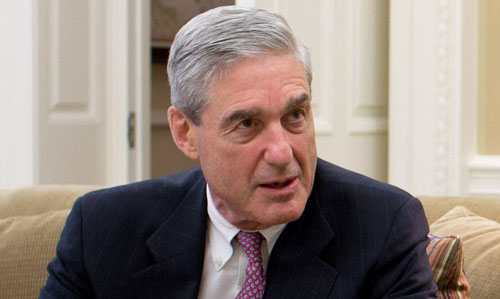by WorldTribune Staff, July 8, 2019
Several Trump associates who were subjects of Robert Mueller’s “crime wave of defamation” are pressing Republican lawmakers to ask the former special counsel why they were targeted when he testifies before Congress on July 17.
“There are over a dozen Trump associates never accused of any wrongdoing yet mentioned more than 100 times each in often misleading and pejorative ways,” in the Mueller report, a former Trump adviser who asked not to be named for fear of receiving a Democratic subpoena, told The Washington Times.

Mueller will appear before two panels — the House Permanent Select Committee on Intelligence and the House Judiciary Committee — in open session. He is scheduled for a total of four hours of open testimony, followed by closed-door sessions.
The adviser wants Republicans to ask why Mueller violated the spirit of Justice Department guidelines which said he was to investigate “any links” between Trump colleagues and Russia.
That “broad order that had him tracking down seeming innocuous encounters,” Rowan Scarborough noted in a July 4 report for the Washington Times.
“Mueller violated the civil rights of President Trump and dozens of his associates,” the former adviser said. “It was a crime wave of defamation.”
The Trump associates also say the Mueller knew there was no Trump-Russia conspiracy months before the March 22 completion date of his investigation but stayed quiet and they want to know why.
“They say the report contains pejorative narratives of innocent conduct for which no one was criminally charged,” Scarborough noted.
Michael Caputo, media adviser for the Trump campaign, asked on his “Still Standing” podcast, “When did Bob Mueller actually know there was no Russian collusion? That matters to me. That matters a lot.” Caputo said that that if Mueller knew before the 2018 midterm elections, “he was rather duty-bound to announce that.”
George Papadopoulos, one of the most FBI-scrutinized Trump campaign volunteers, told The Washington Times that he has a list of questions for Mueller.
U.S. intelligence assigned at least two spies — college professor Stefan Halper and a supposed associate, Azra Turk — to investigate whether Papadopoulos would admit to colluding with Russia. Papadopoulos was in London trying to set up a Kremlin-Trump meeting in 2016.
Papadopoulos always has maintained his innocence. He was never charged in such a conspiracy, but he pleaded guilty to lying to the FBI.
“Were Stefan Halper and Azra Turk working with the CIA?” Papadopoulos asked. “Who was Charles Tawil working for?” he asked, referring to an American-Israeli businessman who handed him $10,000 in cash in a hotel room in Tel Aviv as a consultant’s retainer.
“What kind of businessman gives someone $10,000 — in cash — without a receipt or a contract?” Papadopoulos wrote in his book, “Deep State Target: How I Got Caught in the Crosshairs of the Plot to Bring Down President Trump.” “A terrible one, someone used to paying bribes, or a businessman who is not really a businessman.”
On returning to the U.S. via Washington Dulles International Airport, Papadopoulos was met by FBI agents who vigorously searched his luggage for the Tawil cash, he said. At one point, the FBI threatened to charge him with being an agent of Israel. Under that scenario, the $10,000 would have been evidence of such an arrangement.
Tawil has denied he is a Western agent. He said Papadopoulos asked for the money as a down payment for energy consulting.
“Who was Joseph Mifsud working for?” Papadopoulos asked, referring to a Maltese professor who ingratiated himself to the Trump volunteer in London.
Mifsud told Papadopoulos in April 2016 that he had heard Russia had Hillary Clinton emails. The conversation ultimately persuaded the FBI to open an investigation.
In his 448-page report, Mueller made an overriding conclusion: His large prosecutor/FBI/intelligence team failed to establish a conspiracy between the Trump campaign and Moscow to interfere in the 2016 election by computer hacking and trolling. Not one person was charged in a conspiracy.
Yet the names of about three dozen Trump associates appeared multiple times, often in negative ways, in Mueller’s report.
“Their conduct wasn’t criminal. It often was simply the Washington art of networking or practicing politics during an election,” Scarborough noted.
Carter Page, an Oklahoma City-based energy investor, was one of the most targeted Trump advisers. The FBI tapped his communications for 12 months in 2016 and 2017. It also assigned a spy, Halper, who engaged him in conversations at Cambridge University and at Halper’s home in Virginia. In the end, Page faced no charges.
Former British spy Christopher Steele, in a Democratic Party-financed dossier written from June to December 2016, accused Page of a number of felonies. Clinton operatives spread the false charges among journalists, and the FBI used the dossier extensively.
“The entire document was sourced to Kremlin operatives whose motives to this day are not known,” Scarborough wrote.
In a footnote, the Mueller report refers to Foreign Intelligence Surveillance Act (FISA) warrants on Page. But the report doesn’t point out that the evidence the FBI presented to judges was largely based on the discredited dossier.
Intelligence Brief __________ Replace The Media
